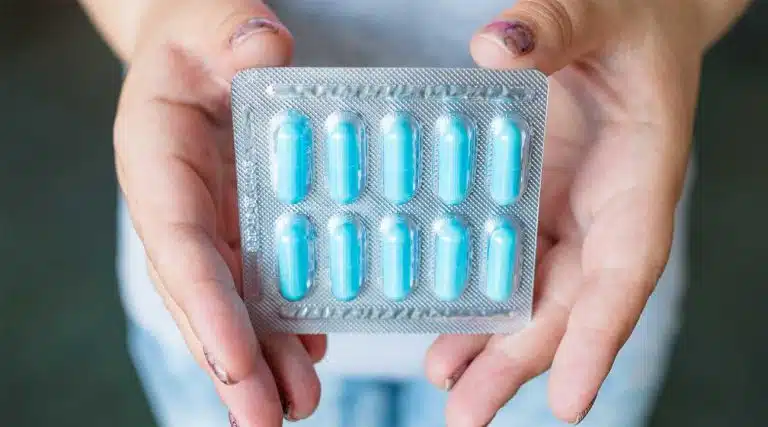Amobarbital (Amytal) Addiction | Abuse Potential, Side Effects, & Treatment Options

Amobarbital is a barbiturate that can treat sleep disorders, such as insomnia. It is a powerful central nervous system (CNS) depressant, and one of its common brand names is Amytal Sodium, which is injected into the body.
Barbiturates are Schedule II, III, or IV controlled substances according to the Drug Enforcement Administration (DEA). Amobarbital is a Schedule II substance, which means it has a high potential for drug abuse and addiction, as well as severe short-term and long-term side effects.
Amobarbital Abuse Potential
Barbiturates have seen much less use over the years as awareness of their dangers have increased. While less barbiturates are available as brand name prescriptions, they still see illicit use in the United States.
Additionally, Amytal Sodium is not an FDA-approved substance as of July 2020.
Forms of substance abuse include:
- taking excessively high doses of amobarbital
- taking amobarbital without a prescription
- taking amobarbital improperly
The strong sedation caused by barbiturates can make them appealing abuse targets. Amobarbital and other barbiturates, such as phenobarbital and secobarbital, are usually abused to relieve anxiety and to treat side effects of other drugs.
Side Effects Of Amytal
General use of amobarbital can cause the following side effects:
- drowsiness
- sluggishness
- headache
- excitement or increased activity
Amytal Sodium can cause the following side effects, especially if injected improperly:
- tissue damage
- tissue death
- pain around the injection site
- gangrene of the injected limb
Abuse of amobarbital can lead to additional effects in both the short-term and long-term.
Barbiturate Intoxication
Taking large doses of amobarbital can lead to impairment. This is known as barbiturate intoxication. Signs of barbiturate intoxication include:
- slurred speech
- irregular eye movements (nystagmus)
- confusion
- irritability
Barbiturate Dependence, Addiction, & Withdrawal
Barbiturates can cause physical dependence if taken over long periods of time. Depending on the specific type prescribed, it can take between 30 to 90 days to develop a dependence. Once this happens, you may experience withdrawal when attempting to stop the drug.
Barbiturate Addiction
Barbiturate addiction can be a result of physical dependence. It is usually characterized by continuous cravings of the drug.
A person addicted to amobarbital may also develop a tolerance to it, which means needing larger doses over time to achieve the same effects. This can increase the chances of overdose and the severity of withdrawal symptoms.
Withdrawal Symptoms
Amobarbital withdrawal can be very unpleasant and difficult to deal with. Barbiturate withdrawal symptoms include:
- weakness
- dizziness
- nausea and vomiting
- insomnia
- seizures
- convulsions
- delirium
Symptoms usually progress from mild to severe, and can last for about 3 weeks after the last dose.
Barbiturate Overdose
Barbiturates are dangerous in part because of their high risk of overdose. Signs of overdose include:
- severe respiratory depression
- increased heart rate
- decreased urination
- hypotension (decreased blood pressure)
- decreased body temperature
The amount of barbiturates needed to cause a lethal overdose is lower than many other CNS depressants (such as alcohol and benzodiazepines). If you or a loved one are taking amobarbital, following the recommended dose is an effective way of preventing overdose.
Treatment Options For Amobarbital Abuse
Because barbiturate withdrawal can be so severe, it can be difficult to recover from addiction without a proper treatment program.
Inpatient Treatment
A stay at a treatment facility or rehab center can help you recover in a safe environment. You will be monitored by medical professionals who can track and manage your barbiturate withdrawal symptoms.
This can also involve coming off amobarbital gradually, where your dose is decreased over time Inpatient care will often increase your chances of getting through withdrawal safely.
Learn more about Inpatient Treatment
Outpatient Treatment
Outpatient care, done mostly at home, can be effective for milder cases of barbiturate addiction. However, this method can be risky because the environment may not be as controlled as a treatment center.
At home, you may still be exposed to various triggers which can cause you to start taking the drug again.
Learn more about Outpatient Treatment
To learn more about potential treatment options for barbiturate use, talk to your healthcare professional or contact us today.
Written by Ark Behavioral Health Editorial Team
©2024 Ark National Holdings, LLC. | All Rights Reserved.
This page does not provide medical advice.
Drug Enforcement Administration (DEA) - Drug Fact Sheet: Barbiturates - DEA
Drug Enforcement Administration (DEA) - Controlled Substance Schedules
National Institute on Drug Abuse - Commonly Used Drugs Charts | National Institute on Drug Abuse (NIDA)
National Institutes of Health - Amobarbital | C11H18N2O3 - PubChem
National Institutes of Health - AMYTAL SODIUM- amobarbital sodium injection, powder, lyophilized, for solution

Questions About Treatment?
Ark Behavioral Health offers 100% confidential substance abuse assessment and treatment placement tailored to your individual needs. Achieve long-term recovery.
100% confidential. We respect your privacy.
Prefer Texting?
Our friendly support team is here to chat 24/7. Opt out any time.







 Learn More
Learn More








